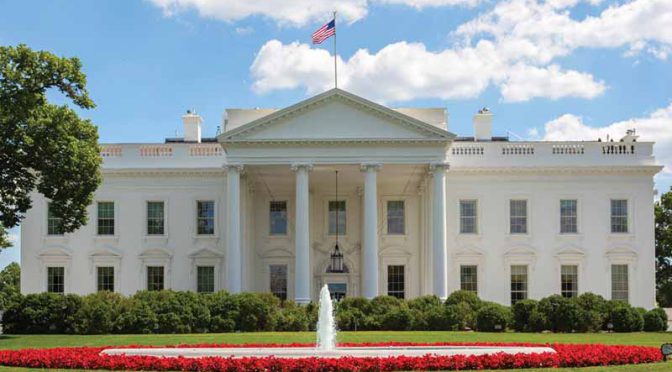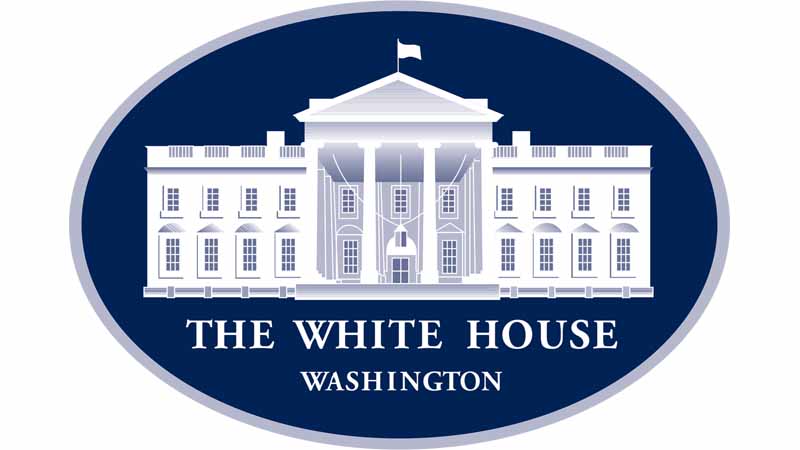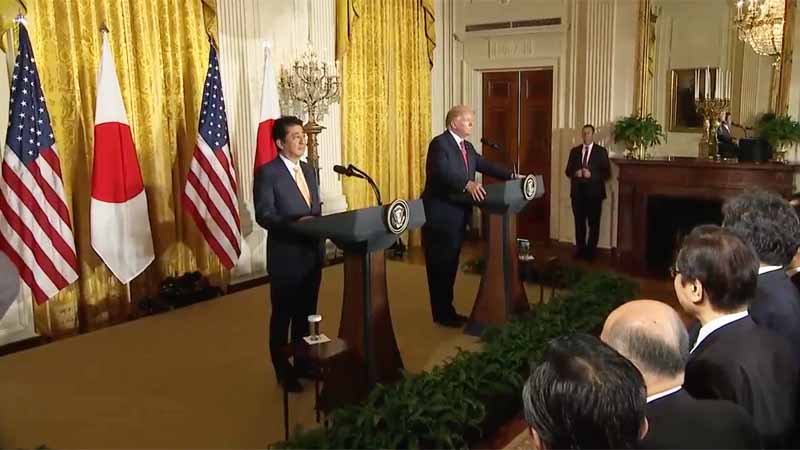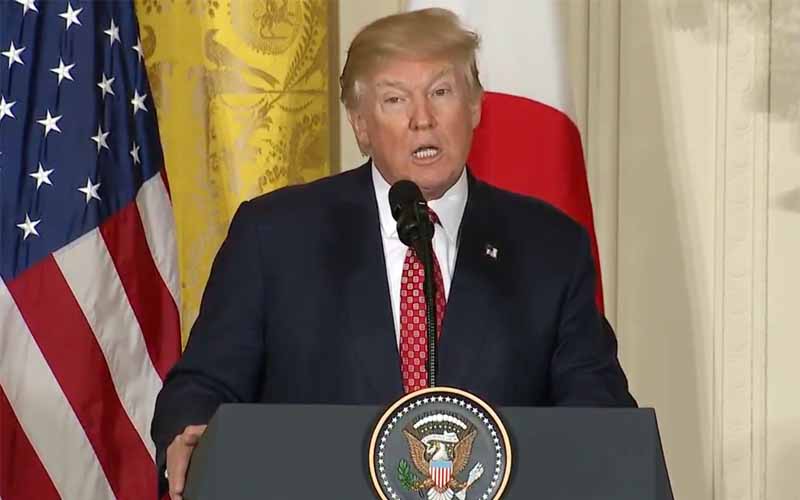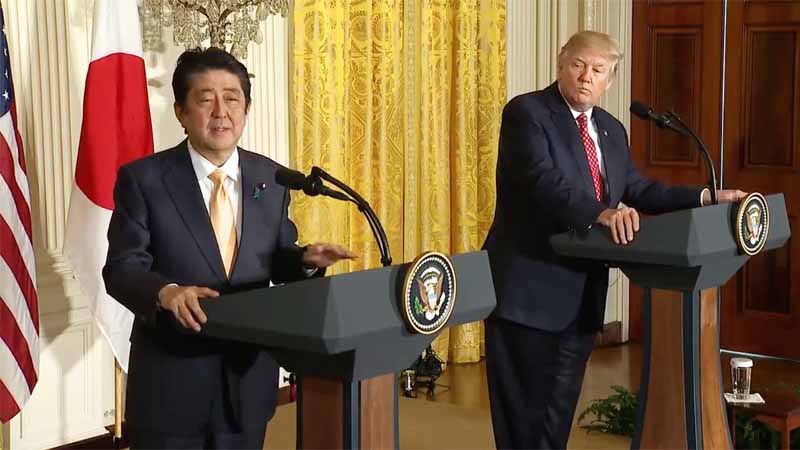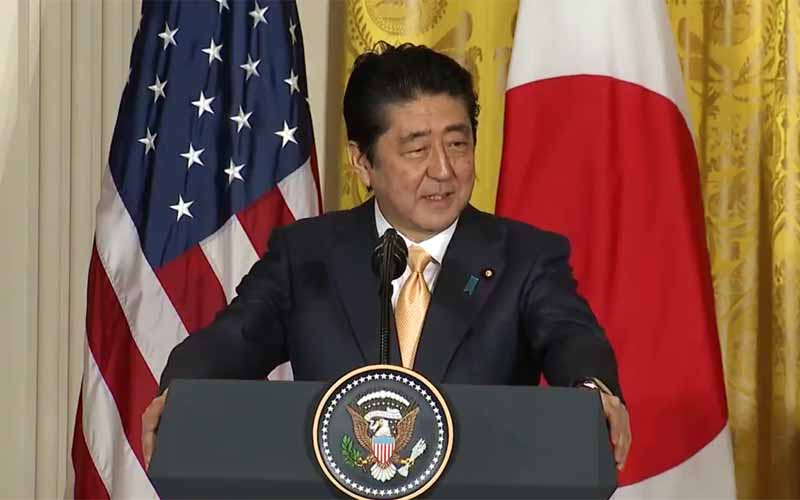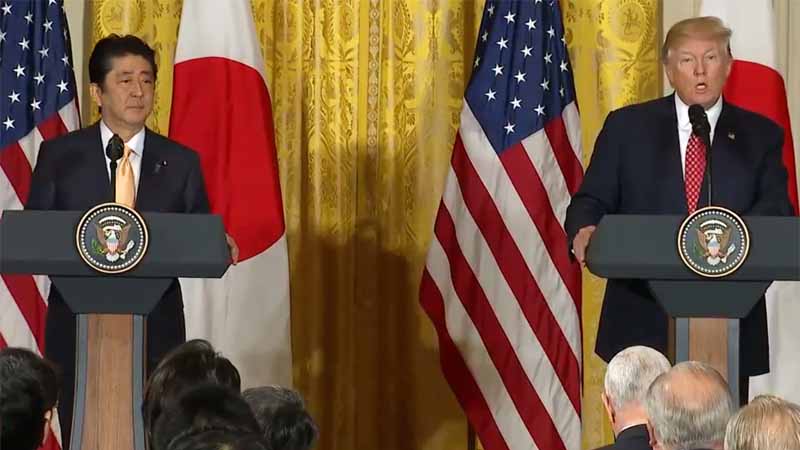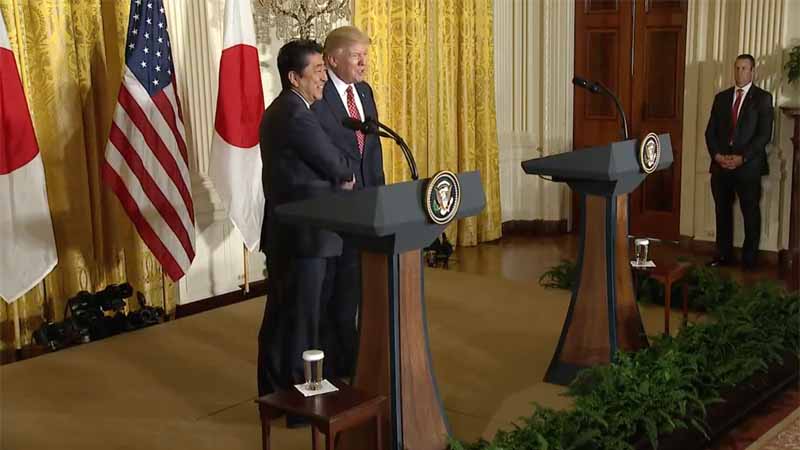共同記者会見後、日本政府はトランプ大統領の年内の公式訪日を要請。さらにペンス副大統領の早期の東京訪問も盛り込まれた
日本時間の2月11日3時30分過ぎ、米国・ホワイトハウス内(ワシントンD.C.)に於いて日本の安倍総理大臣は、米トランプ大統領との初の日米首脳会談を終えた後、同じく当地で国内外の記者団を前に、共同記者会見に臨んだ。
その壇上でトランプ大統領は、「今日の安倍総理大臣の米国訪問を心より歓迎する。日本は重要な同盟国であり、日米同盟は平和と繁栄の礎である」と語った。
またさらに「米国は、日本の施政権下にある地域の安全に関与し、今後もこの重要な同盟関係をさらに強化していく」と述べ、両国の同盟関係をさらに強化していく方針を強調した。
併せて、安倍総理大臣の訪米を前に日本側で危惧していた経済分野については、「日米両国は自由で公平かつ、双方に利益をもたらす経済・貿易関係の構築を目指す」と述べた。
これを受けて安倍総理大臣は、「今から遡ること150年前。我が国に民主主義の素晴らしさを伝えた米国は、今日に於いても民主主義国家のリーダーであり、誰もが夢を叶えることができる国である。
そんな国家に於いてトランプ大統領は、一度も公職の地位に就く事なく、米国全土に於いて1年以上に亘る厳しい選挙戦を勝ち抜き、このたび新大統領に選出された。
それこそまさしく米国の民主主義が持つダイナミズムである」と同国の開かれた自由主義を称えた。
これに続けて安倍総理大臣は、「そうした米国が持つ民主主義のダイナミズムの恩恵を受け、日本企業は、自動車産業を筆頭に米国社会に進出し、今や多くの企業が米国内で雇用を創出している」と、今日の米国経済に於ける日本の役割と貢献を強調した。
また「その上で、日本は高速鉄道を筆頭に自国が保有している高い技術力で、未来の米国に於いても、さらに新しい雇用を生み出すことができる。
今後もこうした経済活動を経て、トランプ大統領が掲げる米国の成長戦略に貢献できる」と畳み掛けた。
加えて日米双方の経済関係を、今後さらに深めていく方策については、「国家間の意見が互いに異なるからと、双方の対話を閉ざすことこそ最も避けるべきであり、テロリスト達はそうした国家間の隙を狙っている。
従って日米両国は、貿易や投資、為替を含む経済関係の発展に関しても対話を続けて行く。
具体的には、麻生副総理兼財務大臣と、米ペンス副大統領の間で、深い対話を積み重ねていくことを介して、両国にとってよりよい合意を見付けていく。
なおこの対話は特定の分野に限らず、広く横断的な話し合いを重ねていく。
またこれについては既にトランプ大統領との間で合意に達した」ことを明らかにした上で、「今後、両国の担当者間との間で、しっかりした枠組みを作り議論を積み重ねていくことで、より良い結果が出るだろう。
私はその成果を楽観視している(なお会見終了後に、日本政府はトランプ大統領の年内の公式訪日を要請。さらにペンス副大統領の早期の東京訪問も盛り込まれた)」と述べた。
加えて会見後に、トランプ大統領がTPP(環太平洋パートナーシップ協定)からの離脱を決め、2国間の貿易協定の締結を目指す姿勢を示していることについて米記者から質問を受けた安倍総理大臣は、「私はTPPに関わるトランプ大統領の判断については、既に承知している。
そうした方針を前提に日米の将来の経済問題については、この会見後のワーキングランチで具体的な話をしていくことになるが、日米両国は双方が互いにリーダーシップを発揮し、アジア太平洋地域ばかりではなく、世界に向けて自由かつ公正なルールに基づいた世界を作り上げていく。
このことについては、トランプ大統領と確認し、既に合意に至っている。貿易協定の形は違えど、この取り組みと姿勢に関する認識と重要性は何ら変わらない」と回答した。
以下はホワイトハウス発表の公式文書となる。
Joint Statement from President Donald J. Trump and Prime Minister Shinzo Abe
President Donald J. Trump and Prime Minister Shinzo Abe held their first official meeting today in Washington D.C. and affirmed their strong determination to further strengthen the U.S.-Japan Alliance and economic relationship.
U.S.-Japan Alliance
The unshakable U.S.-Japan Alliance is the cornerstone of peace, prosperity, and freedom in the Asia-Pacific region. The U.S. commitment to defend Japan through the full range of U.S. military capabilities, both nuclear and conventional, is unwavering. Amid an increasingly difficult security environment in the Asia-Pacific region, the United States will strengthen its presence in the region, and Japan will assume larger roles and responsibilities in the alliance. The United States and Japan will continue to implement and expand defense cooperation as laid out in the 2015 U.S.-Japan Defense Guidelines. The United States and Japan will further enhance cooperation with allies and partners in the region. The two leaders underscored the importance of maintaining international order based upon the rule of law.
The two leaders affirmed the commitment of the United States and Japan to the realignment of U.S. forces in Japan, to ensure the long-term, sustainable presence of U.S. forces. They affirmed that the United States and Japan are committed to the plan to construct the Futenma Replacement Facility at the Camp Schwab/Henoko area and in adjacent waters. It is the only solution that avoids the continued use of Marine Corps Air Station Futenma.
The two leaders affirmed that Article V of the U.S.-Japan Treaty of Mutual Cooperation and Security covers the Senkaku Islands. They oppose any unilateral action that seeks to undermine Japan’s administration of these islands. The United States and Japan will deepen cooperation to safeguard the peace and stability of the East China Sea. The two leaders underscored the importance of maintaining a maritime order based on international law, including freedom of navigation and overflight and other lawful uses of the sea. The United States and Japan oppose any attempt to assert maritime claims through the use of intimidation, coercion or force. The United States and Japan also call on countries concerned to avoid actions that would escalate tensions in the South China Sea, including the militarization of outposts, and to act in accordance with international law.
The United States and Japan strongly urge North Korea to abandon its nuclear and ballistic missile programs and not to take any further provocative actions. The U.S.-Japan Alliance is fully capable of ensuring the security of Japan. The United States is fully committed to defending its homeland, forces, and allies, through the full range of U.S. military capabilities. The two leaders affirmed the importance of an early resolution of the abductions issue. They also affirmed the importance of trilateral cooperation among the United States, Japan and the Republic of Korea. The United States and Japan are also committed to rigorous implementation of the U.N. Security Council resolutions on North Korea.
The United States and Japan will strengthen their bilateral technological cooperation on defense innovation to meet the evolving security challenges. The United States and Japan will also expand bilateral security cooperation in the fields of space and cyberspace. The United States and Japan also strongly condemn terrorism in all forms and manifestations and will enhance our cooperation to fight against terrorist groups that pose a global threat.
The two leaders instructed their foreign and defense ministers to convene a Security Consultative Committee (SCC: “2+2”) meeting to identify ways to further strengthen the U.S.-Japan Alliance, including through the review of the respective roles, missions, and capabilities of the two countries.
U.S.-Japan Economic Relations
The United States and Japan represent 30 percent of the world’s GDP and share an interest in sustaining a strong global economy, ensuring financial stability, and growing job opportunities. To advance these interests, the President and the Prime Minister reaffirmed their commitments to using the three-pronged approach of mutually-reinforcing fiscal, monetary, and structural policies to strengthen domestic and global economic demand.
The two leaders discussed opportunities and challenges facing each of their economies and the need to promote inclusive growth and prosperity in their countries, the Asia-Pacific region, and the world. They emphasized that they remain fully committed to strengthening the economic relationships between their two countries and across the region, based on rules for free and fair trade. This will include setting high trade and investment standards, reducing market barriers, and enhancing opportunities for economic and job growth in the Asia-Pacific.
The United States and Japan reaffirmed the importance of both deepening their trade and investment relations and of their continued efforts in promoting trade, economic growth, and high standards throughout the Asia-Pacific region. Toward this end, and noting that the United States has withdrawn from the Trans-Pacific Partnership, the leaders pledged to explore how best to accomplish these shared objectives. This will include discussions between the United States and Japan on a bilateral framework as well as Japan continuing to advance regional progress on the basis of existing initiatives.
In addition, the two leaders expressed interest in exploring cooperation across sectors that promote mutual economic benefits to the United States and Japan.
The two leaders decided to have their countries engage in an economic dialogue to discuss these and other issues. They also reaffirmed their intent to continue cooperation in regional and global fora.
Invitations to Visit Japan
Prime Minister Abe invited President Trump for an official visit to Japan during the course of this year, and also welcomed an early visit of Vice President Pence to Tokyo. President Trump accepted these invitations.
